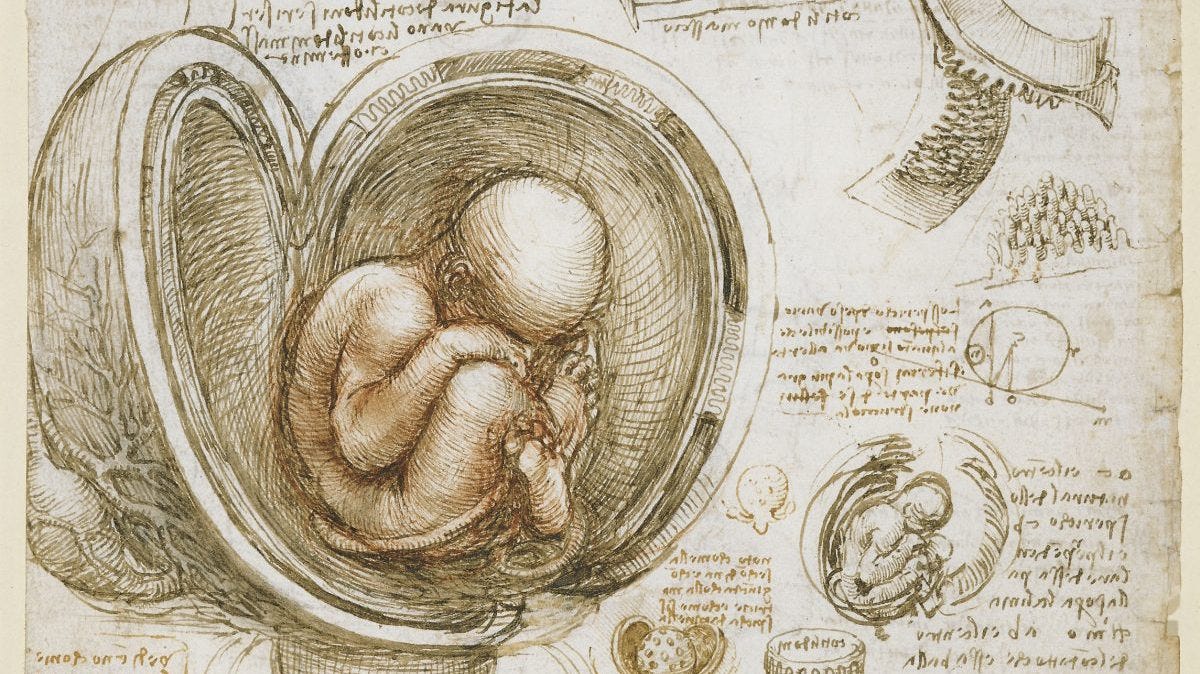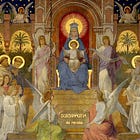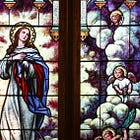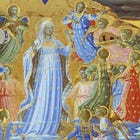Our Lady's womb: Sanctuary of divine expectation and compassion
As his Nativity approached, Christ embraced Man's yearning for redemption, understanding both the depths of human suffering and degradation, and the faintest sparks of good in all creation.

Our Lord’s expectation of his Nativity
From
The Nine Months
The Life of Our Lord in the Womb
Fr Henry James Coleridge
“In the depths of moral degradation, He read only the need of redemption.”
Our Lord’s Heart
Mary bore within her womb One to Whom the full import of the event which was about to take place was more clear than even to herself.
The Heart of our Lord gathered up in His own affections all her yearnings and desires, the yearnings and desires of the whole human world, and of the universe itself. He could understand the perfection of which the Creation which His hand made was capable, what was designed for it in the eternal decrees of its Maker, how glorious was to be that renovation which was to have its source in Him. He could see in everything He had made, and which had been subjected to vanity, as the Apostle says, by the Fall, the want of that greater perfection, and the craving for that more true and abiding beauty.
All natures were open to Him, what they were, and what they might hereafter be, while the harmony and balance and mutual interdependence which bound them together in so marvellous an order, was to His eyes only the promise and foreshadowing of a nobler universe yet to come. He had made the human world His own by becoming Man, and in the human world He had already summed up the various orders of existence to which He had given the life which they possessed. All was to be renovated and elevated, and the principle of the renovation and elevation which were to come lay in His own Humanity.
Good and evil in man
Over that human world the eyes of the future Saviour fell with unutterable love. It was a wild and a tangled maze of degradation and misery, of ignorance where there should have been knowledge of God, of darkness where there should have been light, of foulness where there should have been purity, of cruelty and hatred where gentleness and charity should have reigned. To the Heart of the Saviour of mankind there was nothing, even in all that wilderness of abominations, which did not move the most intense and tender pity. He saw, in all the aberrations of men, the mischief which they generated rather than the guilt which they involved.
He read in their most lowering passions, in their most wanton and barbarous excesses, only their need of the redemption which He came to bring them. The louder the cry of sin and pride and hate rose before the throne of heaven, the more deeply did it pierce His Heart as an appeal for help and light and healing and mercy. The maddest ravings of insolence and blasphemy sounded to Him as the most piteous appeals for mercy and relief. On the Cross He was to say of His murderers, “Father forgive them, for they know not what they do !” and now the whole world of sin and crime was crying out to Heaven for the enlightenment of its ignorances and the pardoning of its sins. He fastened, now as then, on every element in the misery of man which could be pleaded as man’s excuse.
Workings of the good spirit
In the most perverse will He could discern the instinct for good which was wasting itself on a false object. He took account of all the influences of corrupt tradition and evil examples, of the tyranny of the unregenerate world forcing men on to excesses the character of which they did not know. In the depths of moral degradation He read only the need of redemption. His eyes sounded all those depths, and they did not quail before the frightful glare of the Hell to which they led.
He would fain have quenched it for them entirely in His own Blood.
He could count over also all the struggling elements of good which were lost amid this sea of evil. His eye fastened on natural virtues, on half efforts to follow the law of conscience, on devotional impulses diverted to usurping objects, on every faint and secret homage ever paid to truth or virtue or honour, every sacrifice of self-love, every resistance to licence, every courageous persistence in right against the sneering world or the clamouring crowd.
All over the world He saw the evil in a clearness of deformity and a nakedness of malice which would have appalled any but the Saviour. And He saw also good where no one but Himself could have distinguished it from the over-lying mass of evil. He saw the evil only to compassionate it, He rejoiced in the faintest good that He might foster it and strengthen it.
He came now not to judge but to save, and He took into His Heart with infinite tenderness every single feature in the moral condition of mankind as it lay before Him, which called for healing, or which gave the faintest promise of a welcome to His efforts and devices for the accomplishment of the work of salvation.
Our Lord also knew perfectly all the workings of the good Spirit in the souls of men, from the simplest breathings of a desire for the rewards of virtue, and of a life led in obedience to the interior admonitions of conscience, to the most powerful workings of the Holy Ghost in all the divine love and fervour of the highest prayer.
Prayers of the Saints
He understood all that had been from the beginning of the world of heavenly conversation and of holy aspiration, and especially He delighted in discerning and confirming the work of the Holy Ghost, Who had moved the hearts most favoured by Him to longing, and petition, and obsecration, and supplication, for the advent of the promised healing of man.
All these He took up into His own perfect supplication before the throne of His Father, along with the prayers of Mary and Joseph and the living saints of the holy people, who were then more than ever prompted by the Holy Ghost to pour out their hearts in “groanings” ever more intense as they recognised, from the scroll of prophecy, that the appointed time was at hand.
But it was not only that the prayers of the saints who were then to be found among the chosen people were then, as it were, collected in the Sacred Heart and enforced by the strength and might of His own intercession. He was the Lord and Head, not of one generation or nation only, but of all mankind, those who had passed already through the gates of death, and those who were hereafter to enter by the portal of life.
Millions of souls were awaiting in the world beyond the grave the consummation of their redemption by His sacrifice, and the supplications and yearnings of the ancient saints, still praying in Limbus, the vast crowds with whom Purgatory was filled, and the infants without number who had passed away with the sign of the covenant upon them, all were included in the great ocean of supplication which broke continually before the throne of the Majesty on High.
All these prayers and desires were present to the Heart of the Redeemer, as well as the needs of the numberless generations who were to pass through the scene of man’s probation after the Redemption had been fully wrought.
Our Lord before the Passion, so also now
Each onward step in the progress of the great mystery towards its perfect accomplishment was foreordained, and well known in all its circumstances to the Sacred Heart.
Each such step was to our Lord a subject of special and intense prayer, as the moment of its accomplishment drew nigh. When He went forth from the Cenacle, as we are told by St. John, He paused awhile to pour forth that great prayer for the Church of which that Evangelist has given us the record. That prayer was at once the summing up of what He had already done, and the application of what He was about to do to the purposes nearest to His own Heart. He had finished one part of His work, and He was about to take up another.
For everything that our Lord did was done with the utmost tranquillity, and in the most perfect order. He looked back over what He had accomplished, and He looked forward to what He was next to do. Now also when the time had arrived when this new great step was to be taken of the Birth into the world at Bethlehem, it may be thought that He would sum up and make perfect, so to say, what had been His work while in the womb of Mary, and offer it to His Father with His the most tender and reverential love, so to take leave of this the first stage of His existence on earth.
From Fr Henry James Coleridge, The Nine Months: The Life of Our Lord in the Womb, Burns and Oates, London, 1885, pp 354-9
HELP KEEP THE WM REVIEW ONLINE!
As we expand The WM Review we would like to keep providing free articles for everyone.
Our work takes a lot of time and effort to produce. If you have benefitted from it please do consider supporting us financially.
A subscription from you helps ensure that we can keep writing and sharing free material for all. Plus, you will get access to our exclusive members-only material.
(We make our members-only material freely available clergy, priests and seminarians upon request. Please subscribe and reply to the email if this applies to you.)
Subscribe now to make sure you always receive our material. Thank you!
Further Reading
See also The WM Review’s Fr Henry James Coleridge SJ Archive
Follow on Twitter, YouTube and Telegram:







